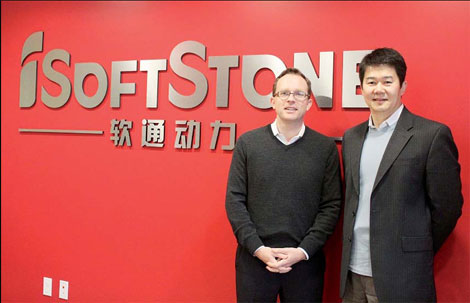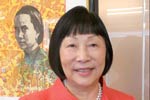US, iSoftStone - a perfect cultural fit
Updated: 2011-09-23 09:10
By Zhang Yuwei (China Daily)
|
|||||||||
|
Anders Brown (left) says iSoftStone has a unique culture. And Li Weiling (right) sees the importance of a local team. Provided to China Daily |
On a hot summer day in July 2007, when two ambitious young American entrepreneurs, Anders Brown and Lincoln Popp, were giving a presentation to a group of senior managers of iSoftStone, a Chinese IT services firm in Beijing, they didn't expect much reaction from the audience.
"Other Chinese companies we did the presentation for just let us talk for an hour without really commenting. But iSoftStone was different. Within five minutes, the management team started asking really good questions and having an open dialogue on how we might work together. It was a bit of a breath of fresh air," Brown recalls.
Both Microsoft veterans, Brown and Popp, who founded Akona Consulting, a Seattle-based business and technology consulting firm, went on the Beijing trip to seek potential offshore partners with lower-cost resources. Brown says the China trip in 2007 was driven by the booming Chinese economy and describes it as being an "eye-opening experience".
The journey also brought them an unexpected result when iSoftStone acquired Akona Consulting in February 2008. Akona became a wholly-owned subsidiary of iSoftStone.
Brown, who now serves as a senior vice-president at iSoftStone in Seattle, says what was unique about the company was that there was a perfect cultural fit from the beginning.
"Both sides had to find some middle ground between Chinese and Western culture. The leadership (of iSoftStone), particularly driven by (founder and CEO) T.W. Liu, was a very balanced culture that we could fit into very easily," Brown says.
"I think openness is the key word. Our global vision impressed them and they wanted to be part of it," says Liu Tianwen, known as T.W. Liu.
"What we found in iSoftStone (and T.W.) was really more of a compelling vision - a vision to go build a global company which we very much connected with from the very beginning," Brown recalls.
The timing of the merger appeared to be right as several months after the acquisition, the financial crisis of 2008 hit the US and many businesses were struggling to survive. However, that wasn't the case for Akona.
"Because of the business we had built - being connected with iSoftStone and part of it, it was very well-positioned to weather the storm in late 2008 and through 2009," Brown says.
Specializing in IT outsourcing, integrating software systems and creating mobile applications for its customers, iSoftStone has more than 9,000 employees in China and serves multinational and Chinese companies including UBS, CitiBank and Huawei.
Seattle is the home for multinational firms including Starbucks, Boeing, Microsoft, Google and Amazon. In the city, one of iSoftStone's biggest customers is Microsoft, which also does business in China with its help.
"It's not like we just provide low-cost services, like outsourcing, taking jobs away. We want to create a win-win solution for our partners, and help them do business in China," Liu says.
"That exceptional talent and proximity to their (iSoftStone's) largest client, Microsoft, were the deciding factors for iSoftStone when they chose Washington for their facility," says Roger Weed, director of the Washington State Department of Commerce.
The state has made great efforts to attract Chinese investments. Washington Governor Christine Gregoire has been a strong advocate for the relationship between her state and China. She has led two separate trade missions to China since she took office in 2005.
China is Washington's largest export market for merchandise and commodities, and continues to grow, according to Weed, who went on the trade missions to China with the governor.
"Although we are unable to track state-level services exports, we know that many Washington state businesses do services-based sales in China. Exports contribute a significant amount to total economic activity and jobs in Washington, so our exports to China are very important," Weed says.
Liu, who obtained a master's degree from the University of Massachusetts and an MBA from Massachusetts Institute of Technology (MIT), founded iSoftStone in Beijing in 2001. By the time, he set the goal of making it a global company.
"We have regarded the US as an important market. But our strategy is to create local teams and seek possible M&A (merger and acquisition) deals to expand our business," he says, adding that small-scale US businesses are their perfect choice.
Using the same business strategy, iSoftStone acquired Boston-based Ascend Technologies last October. And in August this year, it announced a deal to acquire Adventier Consulting Group Inc, a US-based enterprise resource planning consulting services company that provides Fortune 500 companies with its services and solutions.
Liu says iSoftStone has invested about $10 million in the Seattle area, and the company continues to acquire more businesses when they are the right fit.
Weed says China's investment footprint in Washington is still small, but it is an opportunity in the mid- and long-term. Local businesses are thrilled to see Chinese companies investing in Washington, he adds.
"Existing businesses benefit from regional growth in their specific sectors. The Chinese companies bring unique perspectives that help expand the collective knowledge of Washington companies. That expansion creates a 'heat' or 'buzz' around a region, which in turn draws more talent looking for opportunities in their field. It's a win-win for everyone," Weed says.
IT outsourcing industries in China are growing rapidly as the country's Internet market expands.
Brown says local Chinese companies such as iSoftStone could also help those US and European IT outsourcing companies, which are interested in selling their products to China, navigate those local policies and regulations.
"We are as much focused on engineering as we are on the sales side for a company. So it is win-win both ways," Brown says.
At the time of the acquisition in 2008, Akona employed about 40 people, and all of them stayed because they saw the opportunities the new company could provide. Currently, the company has hired about 200 people locally and just moved to a 13,300-sq-ft new office site in Kirkland.
"We are expanding daily," says Li Weiling, vice-president at iSoftStone in Seattle.
"Acquiring a company is like having a new family member. It takes time to nurture and it takes time to integrate," Li adds.
"We had so much enthusiasm around and saw what the future may hold with iSoftStone. Everyone stayed on and everyone is doing new interesting things in their careers now," Brown says.
Liu, the CEO, believes that it is almost counterproductive to send over a whole Chinese team. He wants a management team that knows the local customers better.
"There is also a trust issue involved when you use a local team. But it won't work if you send over a team of Chinese managers," Liu says.
"It would be the local leadership who can serve the local customers best on the day-to-day basis," Li adds.
But most of all, Liu wants to be a Chinese IT entrepreneur who has the vision to build a truly global company.
"Chinese technology companies, like many other tech companies from the US and overseas, can potentially bring high-paying jobs, especially those companies that come to Washington to set up R&D (research and development) facilities and other high value-added activities," Weed says.
(China Daily 09/23/2011 page16)











